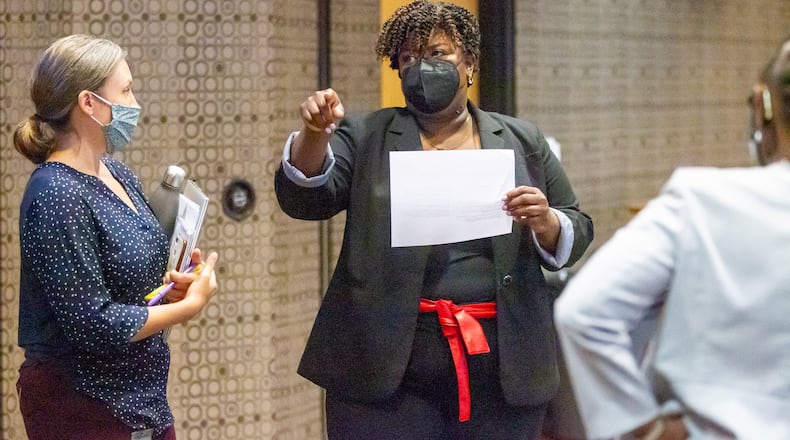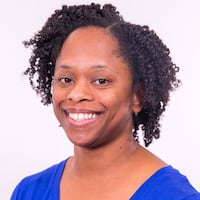A year ago, as schools scrambled to prepare for a pandemic year, new superintendents took over two of Georgia’s largest districts.
Lisa Herring, fresh from her first superintendent’s post in Birmingham, Alabama, was named chief of Atlanta Public Schools following the board’s controversial decision to not extend her predecessor’s contract.
In the neighboring DeKalb County School District, the board hired Cheryl Watson-Harris, a deputy from New York City schools, after unexpectedly withdrawing support from their first finalist.
The two superintendents started high-stakes jobs as COVID-19 swept the state. Both were quickly confronted with the complexities of running big school systems during a crisis.
Atlanta and DeKalb were among the last systems in the metro area to reopen classrooms to in-person learning. APS began to return in late January. DeKalb waited until March, too soon for some families and far too late for others.
Their decisions led to conflict and criticism.
Now, Herring and Watson-Harris are spending the summer readying for a more traditional school year as COVID-19 cases decline.
Credit: Steve Schaefer
Credit: Steve Schaefer
Atlanta Public Schools
When Lisa Herring arrived at APS last July, she stepped into “an invisible culture.”
No shaking hands with teachers or meeting children face-to-face. Hours of virtual introductions and town halls teeming with Facebook comments.
About 60% of Atlanta students have been learning online since spring 2020. On Aug. 5, nearly all are expected to return to classrooms that Herring said will be “as close to normal as possible.”
The APS leader wants to spend the upcoming year in schools building relationships with students, parents and employees.
“That’s the soul of this superintendency,” she said.
Some critics who observed the first lap of her three-year contract think she’s not suited for the post. They say APS failed to communicate clearly about reopening schools and school start times, then waffled under public pressure.
David Hayes, chairman of the Committee for APS Progress, said it may be too late for Herring to build trust. He’s among the parents who think politics delayed school reopenings. He said APS hasn’t provided enough details about how it will help students catch up or accelerate their learning after so much disruption.
“Our hope is that there is going to be a shakeup on the board come November and that she’s going to have a graceful exit,” Hayes said.
Herring stands by the decision to wait until the second semester to resume in-person classes. Only about a third of students returned, a sign that most still weren’t ready, she said. She also faced fierce opposition from some parents and teachers fearful about going back before vaccines were widely available.
“It was the best decision that I could make given the data I had in front of me,” she said.
She said APS got ahead of many districts last summer by telling families the first nine weeks of classes would be held virtually. When in-person learning did resume, the district launched a COVID-19 testing program.
A few months after Herring took office, she appointed the district’s first chief equity and social justice officer, reflecting a promise to focus on those issues.
She acknowledged APS needs to improve communication, saying there’s room for “grace to grow.”
“We were learning … through an urgent, crisis situation, and we know that you can never over-communicate,” she said.
Board member Michelle Olympiadis, who represents an east Atlanta district where some of the loudest opposition has emerged, said communication concerns pre-date this administration. She’s confident it will improve under Herring, whom she called an open-minded leader who “wants the collaboration. She wants the input.”
In the coming year, Herring said she’ll focus on the mental health of students and employees and hire more social workers and psychologists.
The district also will work to identify gaps in students’ math and literacy skills, offer targeted support and bring the best technology from the virtual setting into classrooms, she said.
“If we don’t pull from this crisis an opportunity to soar that would be frustrating,” she said.
Credit: Steve Schaefer
Credit: Steve Schaefer
DeKalb County School District
Cheryl Watson-Harris witnessed the devastating effects of the COVID-19 pandemic in New York City before taking the helm in DeKalb last July.
She said that prepared her to “lead with a certain level of calm and confidence” as she helped DeKalb schools navigate the pandemic. When other metro Atlanta school districts returned to in-person learning, DeKalb stayed the course with virtual learning until the final three months of the school year.
Watson-Harris faced pushback from parents who wanted their kids in classroom and teachers who said they felt unsafe in school buildings. Then there were residents who protested the district’s reopening plan. Some school board members also objected.
Despite being pulled in different directions, school board member Marshall Orson said Watson-Harris “stayed focus on what the science and data was telling us.”
“I appreciate that she wasn’t swayed by the acrimony on both sides of the debate on reopening,” he said.
Watson-Harris told the AJC that she wants to be judged by her work and that residents should always expect the DeKalb County School District to “tell the truth.”
“I want to be held accountable from what I was hired to do,” she said. “I’m here to work on behalf of the children and that’s how I would like to be judged.”
School board chair Vickie Turner said Watson-Harris had to make hard decisions that made her unpopular with some people. Part of the problem was the pandemic didn’t allow for the normal opportunities to build relationships with the community.
“She managed as best as she was able to,” Turner said, adding that “people don’t understand your intentions” sometimes without those relationships in place.
Credit: Steve Schaefer
Credit: Steve Schaefer
Joel Edwards, a community member active in the grassroots organization Restore DeKalb, said he wants Watson-Harris to work on improving the district’s procurement process, renovating older schools, hiring employees to keep up with school maintenance and bring in an outside firm to conduct a forensic audit on the district’s finances.
He also called on the district to revamp its whistleblower policy so employees can file complaints without worrying about their jobs.
“Our teachers and employees should have the right to voice their concerns about situations that happened in the DeKalb County School System and they won’t do that because of the fear of retaliation.”
DeKalb County schools’ enrollment dropped by 5,000 students to 92,353 as of March. Watson-Harris said she hopes those numbers will eventually bounce back to pre-pandemic levels.
She said the district is encouraging children to return to the classroom in the upcoming school year. At the same time, they’re helping families determine whether in-person or remote learning is best for their children.
“We want our scholars back in the building as much as possible,” she said.
Her top priority: tackling what she refers to as a “learning pause” among DeKalb students. On average, they are two to three months behind, she said.
The district used the first two rounds of CARES Act funding to address immediate concerns, and will use the third round of American Rescue Plan dollars to implement longer-term solutions.
Some of those initiatives could include extending the school day either formally or through separate academic programs available for students. Watson-Harris also said along with providing academic support, schools serving as health centers can create community hubs that not only address current learning challenges, but the social and emotional health of students.
“What we have to do is to create the right infrastructure so that they are able to do that,” she said.
Atlanta Public Schools
Enrollment: 51,012
First day of school: Aug. 5
DeKalb County School District
Enrollment: 92,353
First day of School: Aug. 2
Keep Reading
The Latest
Featured








